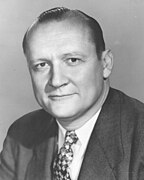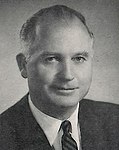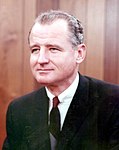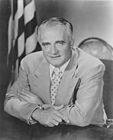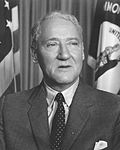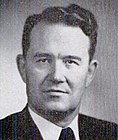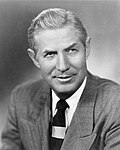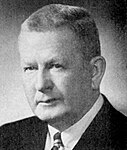1956 United States Senate elections
| ||||||||||||||||||||||||||||||||||||||||
35 of the 96 seats in the United States Senate 49 seats needed for a majority | ||||||||||||||||||||||||||||||||||||||||
|---|---|---|---|---|---|---|---|---|---|---|---|---|---|---|---|---|---|---|---|---|---|---|---|---|---|---|---|---|---|---|---|---|---|---|---|---|---|---|---|---|
| ||||||||||||||||||||||||||||||||||||||||
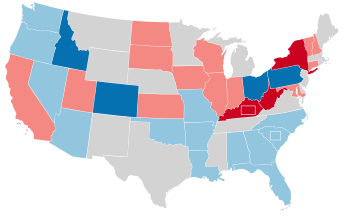 | ||||||||||||||||||||||||||||||||||||||||
| ||||||||||||||||||||||||||||||||||||||||
The 1956 United States Senate elections were elections for the United States Senate that coincided with the re-election of President Dwight D. Eisenhower. The 32 seats of Class 3 were contested in regular elections, and three special elections were held to fill vacancies. Although Democrats gained two seats in regular elections, the Republicans gained two seats in special elections, leaving the party balance of the chamber unchanged.
Democrats defeated incumbents Herman Welker (R-Idaho), George H. Bender (R-Ohio), and James H. Duff (R-Pennsylvania), as well as winning a Republican-held seat in Colorado. Republicans defeated incumbent Earle C. Clements (D-Kentucky) as well as winning Democratic-held seats in Kentucky, New York, and West Virginia. Thus, this election caused Kentucky's Senate delegation to flip from two Democrats to two Republicans.
During the next Congress, Republican John D. Hoblitzell Jr. was appointed to the seat of deceased Senator Matthew M. Neely (D-WV), while Democrat William Proxmire won a special election for the seat of deceased Senator Joseph McCarthy (R-Wisconsin). Also, Democrat Ralph Yarborough won a special election for the seat of Price Daniel (D-Texas), who had resigned from the Senate after being elected Governor of Texas. The net result was to leave the party balance unchanged. Republicans would not win a Senate in West Virginia again until 2014.
Results summary
[edit]| 49 | 47 |
| Democratic | Republican |
Colored shading indicates party with largest share of that row.
| Parties | Total | ||||||||||||||||||||||||||||||||||||||||||||||||||||||||||||||||||||||||||||||||||||||||||||||||||
|---|---|---|---|---|---|---|---|---|---|---|---|---|---|---|---|---|---|---|---|---|---|---|---|---|---|---|---|---|---|---|---|---|---|---|---|---|---|---|---|---|---|---|---|---|---|---|---|---|---|---|---|---|---|---|---|---|---|---|---|---|---|---|---|---|---|---|---|---|---|---|---|---|---|---|---|---|---|---|---|---|---|---|---|---|---|---|---|---|---|---|---|---|---|---|---|---|---|---|---|
| Democratic | Republican | Other | |||||||||||||||||||||||||||||||||||||||||||||||||||||||||||||||||||||||||||||||||||||||||||||||||
| Before these elections | 49 | 47 | 0 | 96 | |||||||||||||||||||||||||||||||||||||||||||||||||||||||||||||||||||||||||||||||||||||||||||||||
| Not up | 31 | 30 | — | 61 | |||||||||||||||||||||||||||||||||||||||||||||||||||||||||||||||||||||||||||||||||||||||||||||||
| Class 1 (1952) | 11 | 20 | — | 31 | |||||||||||||||||||||||||||||||||||||||||||||||||||||||||||||||||||||||||||||||||||||||||||||||
| Class 2 (1954) | 20 | 10 | — | 30 | |||||||||||||||||||||||||||||||||||||||||||||||||||||||||||||||||||||||||||||||||||||||||||||||
| Up | 18 | 17 | — | 35 | |||||||||||||||||||||||||||||||||||||||||||||||||||||||||||||||||||||||||||||||||||||||||||||||
| Class 3 (1950→1956) | 15 | 17 | — | 32 | |||||||||||||||||||||||||||||||||||||||||||||||||||||||||||||||||||||||||||||||||||||||||||||||
| Special: Class 1 | 1 | 0 | — | 1 | |||||||||||||||||||||||||||||||||||||||||||||||||||||||||||||||||||||||||||||||||||||||||||||||
| Special: Class 2 | 2 | 0 | — | 2 | |||||||||||||||||||||||||||||||||||||||||||||||||||||||||||||||||||||||||||||||||||||||||||||||
| Incumbent retired | 5 | 1 | — | 6 | |||||||||||||||||||||||||||||||||||||||||||||||||||||||||||||||||||||||||||||||||||||||||||||||
| Held by same party | 2 | 0 | — | 2 | |||||||||||||||||||||||||||||||||||||||||||||||||||||||||||||||||||||||||||||||||||||||||||||||
| Replaced by other party | — | 4 | |||||||||||||||||||||||||||||||||||||||||||||||||||||||||||||||||||||||||||||||||||||||||||||||||
| Result | 3 | 3 | 0 | 6 | |||||||||||||||||||||||||||||||||||||||||||||||||||||||||||||||||||||||||||||||||||||||||||||||
| Incumbent ran | 13 | 16 | — | 29 | |||||||||||||||||||||||||||||||||||||||||||||||||||||||||||||||||||||||||||||||||||||||||||||||
| Won re-election | 12 | 13 | — | 25 | |||||||||||||||||||||||||||||||||||||||||||||||||||||||||||||||||||||||||||||||||||||||||||||||
| Lost re-election | — | 4 | |||||||||||||||||||||||||||||||||||||||||||||||||||||||||||||||||||||||||||||||||||||||||||||||||
| Lost renomination but held by same party |
0 | 0 | — | 0 | |||||||||||||||||||||||||||||||||||||||||||||||||||||||||||||||||||||||||||||||||||||||||||||||
| Result | 15 | 14 | 0 | 29 | |||||||||||||||||||||||||||||||||||||||||||||||||||||||||||||||||||||||||||||||||||||||||||||||
| Total elected | 18 | 17 | 0 | 35 | |||||||||||||||||||||||||||||||||||||||||||||||||||||||||||||||||||||||||||||||||||||||||||||||
| Net change | 0 | ||||||||||||||||||||||||||||||||||||||||||||||||||||||||||||||||||||||||||||||||||||||||||||||||||
| Nationwide vote | 23,291,351[a] | 22,219,450 | 406,207 | 45,917,008 | |||||||||||||||||||||||||||||||||||||||||||||||||||||||||||||||||||||||||||||||||||||||||||||||
| Share | 50.72% | 48.39% | 0.88% | 100% | |||||||||||||||||||||||||||||||||||||||||||||||||||||||||||||||||||||||||||||||||||||||||||||||
| Result | 49 | 47 | 0 | 96 | |||||||||||||||||||||||||||||||||||||||||||||||||||||||||||||||||||||||||||||||||||||||||||||||
Source: Clerk of the U.S. House of Representatives[1]
Gains, losses, and holds
[edit]Retirements
[edit]One Republican and five Democrats retired instead of seeking re-election.
Defeats
[edit]Three Republicans and one Democrat sought re-election but lost in the general election.
| State | Senator | Replaced by |
|---|---|---|
| Idaho | Herman Welker | Frank Church |
| Kentucky | Earle Clements | Thruston Ballard Morton |
| Ohio | George H. Bender | Frank Lausche |
| Pennsylvania | James H. Duff | Joseph S. Clark Jr. |
Post-election changes
[edit]One Republican was appointed to the seat of a deceased Democrat. Two Democrats won special elections, one seat was previously held by a Democrat and another by a Republican. One Democrat was appointed to replace another Democrat.
Change in composition
[edit]Before the elections
[edit]| D1 | D2 | D3 | D4 | D5 | D6 | D7 | D8 | ||
| D18 | D17 | D16 | D15 | D14 | D13 | D12 | D11 | D10 | D9 |
| D19 | D20 | D21 | D22 | D23 | D24 | D25 | D26 | D27 | D28 |
| D38 Ky. (sp) Ran |
D37 Ky. (reg) Ran |
D36 Ga. Retired |
D35 Florida Ran |
D34 Ark. Ran |
D33 Ariz. Ran |
D32 Ala. Ran |
D31 | D30 | D29 |
| D39 La. Ran |
D40 Mo. Ran |
D41 Nev. Ran |
D42 N.Y. Retired |
D43 N.C. Ran |
D44 Okla. Ran |
D45 Ore. Ran |
D46 S.C. (reg) Ran |
D47 S.C. (sp) Retired |
D48 Washington Ran |
| Majority → | D49 W.Virginia (sp) Retired | ||||||||
| R39 Maryland Ran |
R40 N.H. Ran |
R41 N.D. Ran |
R42 Ohio Ran |
R43 Pa. Ran |
R44 S.D. Ran |
R45 Utah Ran |
R46 Vt. Ran |
R47 Wisc. Ran | |
| R38 Kan. Ran |
R37 Iowa Ran |
R36 Ind. Ran |
R35 Ill. Ran |
R34 Idaho Ran |
R33 Conn. Ran |
R32 Colo. Retired |
R31 California Ran |
R30 | R29 |
| R19 | R20 | R21 | R22 | R23 | R24 | R25 | R26 | R27 | R28 |
| R18 | R17 | R16 | R15 | R14 | R13 | R12 | R11 | R10 | R9 |
| R1 | R2 | R3 | R4 | R5 | R6 | R7 | R8 | ||
Elections results
[edit]| D1 | D2 | D3 | D4 | D5 | D6 | D7 | D8 | ||
| D18 | D17 | D16 | D15 | D14 | D13 | D12 | D11 | D10 | D9 |
| D19 | D20 | D21 | D22 | D23 | D24 | D25 | D26 | D27 | D28 |
| D38 Mo. Re-elected |
D37 La. Re-elected |
D36 Ga. Hold |
D35 Florida Re-elected |
D34 Ark. Re-elected |
D33 Ariz. Re-elected |
D32 Ala. Re-elected |
D31 | D30 | D29 |
| D39 Nev. Re-elected |
D40 N.C. Re-elected |
D41 Okla. Re-elected |
D42 Ore. Re-elected |
D43 S.C. (reg) Re-elected |
D44 S.C. (sp) Hold |
D45 Washington Re-elected |
D46 Colo. Gain |
D47 Idaho Gain |
D48 Ohio Gain |
| Majority → | D49 Pa. Gain | ||||||||
| R39 N.D. Re-elected |
R40 S.D. Re-elected |
R41 Utah Re-elected |
R42 Vt. Re-elected |
R43 Wisc. Re-elected |
R44 Ky. (reg) Gain |
R45 Ky. (sp) Gain |
R46 N.Y. Gain |
R47 W.Virginia (sp) Gain | |
| R38 N.H. Re-elected |
R37 Maryland Re-elected |
R36 Kan. Re-elected |
R35 Iowa Re-elected |
R34 Ind. Re-elected |
R33 Ill. Re-elected |
R32 Conn. Re-elected |
R31 California Re-elected |
R30 | R29 |
| R19 | R20 | R21 | R22 | R23 | R24 | R25 | R26 | R27 | R28 |
| R18 | R17 | R16 | R15 | R14 | R13 | R12 | R11 | R10 | R9 |
| R1 | R2 | R3 | R4 | R5 | R6 | R7 | R8 | ||
| Key |
|
|---|
Race summaries
[edit]Special elections during the 84th Congress
[edit]In these special elections, the winners were seated during 1956 or in 1957 before January 3; ordered by election date, then state.
| State | Incumbent | Results | Candidates | ||
|---|---|---|---|---|---|
| Senator | Party | Electoral history | |||
| Kentucky (Class 2) |
Robert Humphreys | Democratic | 1956 (Appointed) | Interim appointee retired. New senator elected November 6, 1956. Republican gain. |
|
| South Carolina (Class 2) |
Thomas A. Wofford | Democratic | 1956 (Appointed) | Interim appointee retired. New senator elected November 6, 1956. Democratic hold. |
|
| West Virginia (Class 1) |
William Laird III | Democratic | 1956 (Appointed) | Interim appointee retired. New senator elected November 6, 1956. Republican gain. |
|
Races leading to the 85th Congress
[edit]In these regular elections, the winners were elected for the term beginning January 3, 1957; ordered by state.
All of the elections involved the Class 3 seats.
| State | Incumbent | Results | Candidates | ||
|---|---|---|---|---|---|
| Senator | Party | Electoral history | |||
| Alabama | J. Lister Hill | Democratic | 1938 (Appointed) 1938 1944 1950 |
Incumbent re-elected. |
|
| Arizona | Carl Hayden | Democratic | 1926 1932 1938 1944 1950 |
Incumbent re-elected. |
|
| Arkansas | J. William Fulbright | Democratic | 1944 1950 |
Incumbent re-elected. |
|
| California | Thomas Kuchel | Republican | 1953 (Appointed) 1954 (special) |
Incumbent re-elected. |
|
| Colorado | Eugene Millikin | Republican | 1941 (Appointed) 1942 (special) 1944 1950 |
Incumbent retired. New senator elected. Democratic gain. |
|
| Connecticut | Prescott Bush | Republican | 1952 (special) | Incumbent re-elected. |
|
| Florida | George Smathers | Democratic | 1950 | Incumbent re-elected. |
|
| Georgia | Walter F. George | Democratic | 1922 (special) 1926 1932 1938 1944 1950 |
Incumbent retired. New senator elected. Democratic hold. |
|
| Idaho | Herman Welker | Republican | 1950 | Incumbent lost re-election. New senator elected. Democratic gain. |
|
| Illinois | Everett Dirksen | Republican | 1950 | Incumbent re-elected. |
|
| Indiana | Homer E. Capehart | Republican | 1944 1950 |
Incumbent re-elected. |
|
| Iowa | Bourke B. Hickenlooper | Republican | 1944 1950 |
Incumbent re-elected. |
|
| Kansas | Frank Carlson | Republican | 1950 (special) 1950 |
Incumbent re-elected. |
|
| Kentucky | Earle Clements | Democratic | 1950 (special) 1950 |
Incumbent lost re-election. New senator elected. Republican gain. |
|
| Louisiana | Russell B. Long | Democratic | 1948 (special) 1950 |
Incumbent re-elected. |
|
| Maryland | John Marshall Butler | Republican | 1950 | Incumbent re-elected. |
|
| Missouri | Thomas C. Hennings Jr. | Democratic | 1950 | Incumbent re-elected. |
|
| Nevada | Alan Bible | Democratic | 1954 (special) | Incumbent re-elected. |
|
| New Hampshire | Norris Cotton | Republican | 1954 (special) | Incumbent re-elected. |
|
| New York | Herbert H. Lehman | Democratic | 1949 (special) 1950 |
Incumbent retired. New senator elected. Republican gain. Winner delayed term until January 9, 1957, when he resigned his post as an Attorney General of New York. |
|
| North Carolina | Sam Ervin | Democratic | 1954 (Appointed) 1954 (special) |
Incumbent re-elected. |
|
| North Dakota | Milton Young | Republican | 1945 (Appointed) 1946 (special) 1950 |
Incumbent re-elected. |
|
| Ohio | George H. Bender | Republican | 1954 (special) | Incumbent lost re-election. New senator elected. Democratic gain. |
|
| Oklahoma | Mike Monroney | Democratic | 1950 | Incumbent re-elected. |
|
| Oregon | Wayne Morse | Democratic | 1944[c] 1950 |
Incumbent re-elected. |
|
| Pennsylvania | James H. Duff | Republican | 1950 | Incumbent lost re-election. New senator elected. Democratic gain. |
|
| South Carolina | Olin D. Johnston | Democratic | 1944 1950 |
Incumbent re-elected. |
|
| South Dakota | Francis Case | Republican | 1950 | Incumbent re-elected. |
|
| Utah | Wallace F. Bennett | Republican | 1950 | Incumbent re-elected. |
|
| Vermont | George Aiken | Republican | 1940 (special) 1944 1950 |
Incumbent re-elected. |
|
| Washington | Warren Magnuson | Democratic | 1944 (Appointed) 1944 1950 |
Incumbent re-elected. |
|
| Wisconsin | Alexander Wiley | Republican | 1938 1944 1950 |
Incumbent re-elected. |
|
Closest races
[edit]Fifteen races had a margin of victory under 10%:
| State | Party of winner | Margin |
|---|---|---|
| Colorado | Democratic (flip) | 0.4%[d] |
| Pennsylvania | Democratic (flip) | 0.4% |
| Kentucky | Republican (flip) | 0.8% |
| South Dakota | Republican | 1.6% |
| Nevada | Democratic | 5.2% |
| Ohio | Democratic | 5.8% |
| Maryland | Republican | 6.0% |
| Kentucky (special) | Republican (flip) | 6.4% |
| New York | Republican (flip) | 6.6% |
| West Virginia (special) | Republican (flip) | 7.4% |
| Iowa | Republican | 7.8% |
| Utah | Republican | 8.0% |
| California | Republican | 8.34% |
| Illinois | Republican | 8.39% |
| Oregon | Democratic | 8.4% |
Alabama
[edit]
| |||||||||||||||||
| |||||||||||||||||
 County results Hill: 50–60% 60–70% 70–80% 80–90% >90% Crommelin: 50–60% | |||||||||||||||||
| |||||||||||||||||
| Party | Candidate | Votes | % | |
|---|---|---|---|---|
| Democratic | J. Lister Hill (Incumbent) | 330,182 | 100.00 | |
| Democratic hold | ||||
Arizona
[edit]
| |||||||||||||||||
 County results Hayden: 50–60% 60–70% 70–80% 80–90% | |||||||||||||||||
| |||||||||||||||||
| Party | Candidate | Votes | % | |
|---|---|---|---|---|
| Democratic | Carl Hayden (Incumbent) | 170,816 | 61.39 | |
| Republican | Ross F. Jones | 107,447 | 38.61 | |
| Majority | 63,369 | 22.78 | ||
| Turnout | 278,263 | |||
| Democratic hold | ||||
Arkansas
[edit]
| |||||||||||||||||
| |||||||||||||||||
 County results Fulbright: 50–60% 60–70% 70–80% 80–90% >90% Henley: 50–60% | |||||||||||||||||
| |||||||||||||||||
| Party | Candidate | Votes | % | |
|---|---|---|---|---|
| Democratic | J. William Fulbright (Incumbent) | 331,689 | 82.98 | |
| Republican | Ben C. Henley | 68,016 | 17.02 | |
| Majority | 263,673 | 65.96 | ||
| Turnout | 399,705 | |||
| Democratic hold | ||||
California
[edit]
| |||||||||||||||||
| |||||||||||||||||
 County results Kuchel: 40–50% 50–60% 60–70% 70–80% 80–90% Richards: 40–50% 50–60% | |||||||||||||||||
| |||||||||||||||||
| Party | Candidate | Votes | % | |
|---|---|---|---|---|
| Republican | Thomas Kuchel (Incumbent) | 2,892,918 | 53.96 | |
| Democratic | Richard Richards | 2,445,816 | 45.62 | |
| Prohibition | Ray Gourley | 22,410 | 0.42 | |
| None | Scattering | 323 | 0.01 | |
| Majority | 447,102 | 8.34 | ||
| Turnout | 5,361,467 | |||
| Republican hold | ||||
Colorado
[edit]
| |||||||||||||||||
| |||||||||||||||||
 Results by county Carroll: 50–60% 60–70% Thornton: 50–60% 60–70% | |||||||||||||||||
| |||||||||||||||||
| Party | Candidate | Votes | % | |
|---|---|---|---|---|
| Democratic | John A. Carroll | 319,872 | 50.22 | |
| Republican | Dan Thornton | 317,102 | 49.78 | |
| Majority | 2,770 | 0.44 | ||
| Turnout | 636,974 | |||
| Democratic gain from Republican | ||||
Connecticut
[edit]
| |||||||||||||||||
| |||||||||||||||||
Bush: 40-50% 50-60% 60-70% 70-80% 80-90% Dodd: 40–50% 50–60% 60-70% | |||||||||||||||||
| |||||||||||||||||
| Party | Candidate | Votes | % | |
|---|---|---|---|---|
| Republican | Prescott Bush (Incumbent) | 610,829 | 54.84 | |
| Democratic | Thomas J. Dodd | 479,460 | 43.05 | |
| Independent Republican | Suzanne S. Stevenson | 10,199 | 0.92 | |
| Socialist | Jasper McLevy | 7,079 | 0.64 | |
| Write-In | Vivien Kellems | 6,219 | 0.56 | |
| None | Scattering | 33 | 0.00 | |
| Majority | 131,369 | 11.79 | ||
| Turnout | 1,113,819 | |||
| Republican hold | ||||
Florida
[edit]
| |||||||||||||||||
| |||||||||||||||||
 County results Smathers: 90-100% | |||||||||||||||||
| |||||||||||||||||
| Party | Candidate | Votes | % | |
|---|---|---|---|---|
| Democratic | George A. Smathers (incumbent) | 655,418 | 100.00 | |
| Democratic hold | ||||
Georgia
[edit]| Party | Candidate | Votes | % | |
|---|---|---|---|---|
| Democratic | Herman Talmadge | 541,094 | 99.97 | |
| None | Scattering | 173 | 0.03 | |
| Majority | 540,921 | 99.94 | ||
| Turnout | 541,267 | |||
| Democratic hold | ||||
Idaho
[edit]
| |||||||||||||||||||||
| |||||||||||||||||||||
 County results Church: 40–50% 50–60% 60–70% 70–80% Welker: 40–50% 50-60% | |||||||||||||||||||||
| |||||||||||||||||||||
| Party | Candidate | Votes | % | |
|---|---|---|---|---|
| Democratic | Frank Church | 149,096 | 56.20 | |
| Republican | Herman Welker (Incumbent) | 102,781 | 38.74 | |
| Write-in | Glen Taylor | 13,415 | 5.06 | |
| Majority | 46,315 | 17.46 | ||
| Turnout | 265,292 | |||
| Democratic gain from Republican | ||||
Illinois
[edit]| Turnout | 81.74% | ||||||||||||||||
|---|---|---|---|---|---|---|---|---|---|---|---|---|---|---|---|---|---|
| |||||||||||||||||
 County results Dirksen: 50-60% 60-70% 70-80% Stengel: 50–60% | |||||||||||||||||
| |||||||||||||||||
| Party | Candidate | Votes | % | |
|---|---|---|---|---|
| Republican | Everett Dirksen (Incumbent) | 2,307,352 | 54.10 | |
| Democratic | Richard Stengel | 1,949,883 | 45.72 | |
| Socialist Labor | Louis Fisher | 7,587 | 0.18 | |
| None | Scattering | 8 | 0.00 | |
| Majority | 357,469 | 8.38 | ||
| Turnout | 4,264,830 | |||
| Republican hold | ||||
Indiana
[edit]
| |||||||||||||||||
| |||||||||||||||||
 County results Capehart: 50–60% 60-70% 70-80% Wickard: 40–50% 50–60% | |||||||||||||||||
| |||||||||||||||||
| Party | Candidate | Votes | % | |
|---|---|---|---|---|
| Republican | Homer Capehart (Incumbent) | 1,084,262 | 55.20 | |
| Democratic | Claude R. Wickard | 871,781 | 44.39 | |
| Prohibition | Carl W. Thompson | 6,685 | 0.34 | |
| Socialist Labor | Gordon A. Long | 1,258 | 0.06 | |
| Majority | 212,481 | 10.81 | ||
| Turnout | 1,963,986 | |||
| Republican hold | ||||
Iowa
[edit]
| |||||||||||||||||
| |||||||||||||||||
 County results Stanley: 50-60% 60-70% 70-80% Evans: 50–60% | |||||||||||||||||
| |||||||||||||||||
| Party | Candidate | Votes | % | |
|---|---|---|---|---|
| Republican | Bourke B. Hickenlooper (Incumbent) | 635,499 | 53.92 | |
| Democratic | Rudolph M. Evans | 543,156 | 46.08 | |
| Majority | 92,343 | 7.84 | ||
| Turnout | 1,178,655 | |||
| Republican hold | ||||
Kansas
[edit]
| |||||||||||||||||
| |||||||||||||||||
 County results Carlson: 40–50% 50–60% 60–70% 70–80% Hart: 50–60% | |||||||||||||||||
| |||||||||||||||||
| Party | Candidate | Votes | % | |
|---|---|---|---|---|
| Republican | Frank Carlson (Incumbent) | 477,822 | 57.90 | |
| Democratic | George Hart | 333,939 | 40.46 | |
| Prohibition | C. Floyd Hester | 13,519 | 1.64 | |
| Majority | 143,883 | 17.44 | ||
| Turnout | 825,280 | |||
| Republican hold | ||||
Kentucky
[edit]Two elections in Kentucky converted both seats from Democratic to Republican. As a result, this marked the first time since 1916 that both Senate seats in a state flipped from one party to the other in a single election cycle.
Kentucky (special)
[edit]
| |||||||||||||||||
| |||||||||||||||||
 County results Sherman: 50-60% 60-70% 70–80% 80–90% Wetherby: 50–60% 60–70% 70–80% | |||||||||||||||||
| |||||||||||||||||
Following the death of Alben Barkley on April 30, 1956, Robert Humphreys was appointed June 21, 1956 to continue the term, pending a special election.[2] Humphreys did not run in the special election to finish the term that would end in 1961.
Republican former-senator John Sherman Cooper, who had twice won special elections to that seat in 1946 and 1952, was again elected to finish the term.
| Party | Candidate | Votes | % | |
|---|---|---|---|---|
| Republican | John Sherman Cooper | 538,505 | 53.23 | |
| Democratic | Lawrence W. Wetherby | 473,140 | 46.77 | |
| Majority | 65,365 | 6.46 | ||
| Turnout | 1,011,645 | |||
| Republican gain from Democratic | ||||
This time, however, Cooper would be re-elected in 1960 and again in 1966, serving until his 1973 retirement.
Kentucky (regular)
[edit]
| |||||||||||||||||
| |||||||||||||||||
 County results Morton: 50–60% 60–70% 70–80% 80–90% Clements: 50–60% 60–70% 70–80% 80–90% | |||||||||||||||||
| |||||||||||||||||
First-term Democrat Earle Clements lost re-election to Republican Thruston B. Morton, who was Eisenhower's Assistant Secretary of State for Legislative Affairs.
| Party | Candidate | Votes | % | |
|---|---|---|---|---|
| Republican | Thruston B. Morton | 506,903 | 50.35 | |
| Democratic | Earle Clements (Incumbent) | 499,922 | 49.65 | |
| Majority | 6,981 | 0.70 | ||
| Turnout | 1,006,825 | |||
| Republican gain from Democratic | ||||
Louisiana
[edit]
| |||||||||||||||||
| |||||||||||||||||
 Parish results Long: >90% | |||||||||||||||||
| |||||||||||||||||
| Party | Candidate | Votes | % | |
|---|---|---|---|---|
| Democratic | Russell Long (Incumbent) | 335,564 | 100.00 | |
| Democratic hold | ||||
Maryland
[edit]
| |||||||||||||||||
| |||||||||||||||||
 County results Butler: 50–60% 60–70% Mahoney: 50–60% | |||||||||||||||||
| |||||||||||||||||
| Party | Candidate | Votes | % | |
|---|---|---|---|---|
| Republican | John Marshall Butler (Incumbent) | 473,059 | 52.96 | |
| Democratic | George P. Mahoney | 420,108 | 47.04 | |
| Majority | 52,951 | 5.92 | ||
| Turnout | 893,167 | |||
| Republican hold | ||||
Missouri
[edit]
| |||||||||||||||||
 County results Hennings: 50–60% 60–70% 70–80% 80–90% Douglas: 50–60% 60–70% 70–80% | |||||||||||||||||
| |||||||||||||||||
| Party | Candidate | Votes | % | |
|---|---|---|---|---|
| Democratic | Thomas C. Hennings Jr. (Incumbent) | 1,015,936 | 56.41 | |
| Republican | Herbert Douglas | 785,048 | 43.59 | |
| Majority | 230,888 | 12.82 | ||
| Turnout | 1,800,984 | |||
| Democratic hold | ||||
Nevada
[edit]
| |||||||||||||||||
| |||||||||||||||||
 County results Bible: 50–60% 60–70% Young: 50–60% 60–70% | |||||||||||||||||
| |||||||||||||||||
| Party | Candidate | Votes | % | |
|---|---|---|---|---|
| Democratic | Alan Bible (Incumbent) | 50,677 | 52.58 | |
| Republican | Cliff Young | 45,712 | 47.42 | |
| Majority | 4,965 | 5.16 | ||
| Turnout | 96,389 | |||
| Democratic hold | ||||
New Hampshire
[edit]
| |||||||||||||||||
| |||||||||||||||||
 County results Cotton: 50–60% 60–70% 70–80% 80–90% | |||||||||||||||||
| |||||||||||||||||
| Party | Candidate | Votes | % | |
|---|---|---|---|---|
| Republican | Norris Cotton (Incumbent) | 161,424 | 64.07 | |
| Democratic | Laurence M. Pickett | 90,519 | 35.93 | |
| Majority | 70,905 | 28.14 | ||
| Turnout | 251,943 | |||
| Republican hold | ||||
New York
[edit]
| ||||||||||||||||||||
| ||||||||||||||||||||
 County results Javits: 50–60% 60–70% 70–80% Wagner: 50–60% 60–70% | ||||||||||||||||||||
| ||||||||||||||||||||
In New York, the Republican state convention met on September 10 at Albany, New York, and nominated New York State Attorney General Jacob K. Javits.[3] The Democratic state convention met on September 10 at Albany, New York, and nominated Mayor of New York City Robert F. Wagner Jr., for the U.S. Senate.[4] The Liberal Party endorsed the Democratic nominee, Mayor Robert F. Wagner Jr., for the U.S. Senate.[5] On October 1, a movement was launched to vote for General of the Army Douglas MacArthur as a write-in candidate for the U.S. Senate.[6] On October 2, MacArthur disavowed the campaign, and stated that he was not a candidate.[7]
The Republican candidate was elected.
| Party | Candidate | Votes | % | |
|---|---|---|---|---|
| Republican | Jacob Javits | 3,723,933 | 53.26 | |
| Democratic | Robert F. Wagner Jr. | 3,265,159 | 46.70 | |
| None | Scattering | 1,390 | 0.02 | |
| None | Miscellaneous | 654 | 0.01 | |
| Majority | 458,774 | 6.56 | ||
| Turnout | 6,991,136 | |||
| Republican gain from Democratic | ||||
North Carolina
[edit]
| |||||||||||||||||
| |||||||||||||||||
 County results Ervin: 50–60% 60–70% 70–80% 80–90% >90% Johnson: 50-60% 60-70% 70–80% | |||||||||||||||||
| |||||||||||||||||
| Party | Candidate | Votes | % | |
|---|---|---|---|---|
| Democratic | Samuel J. Ervin Jr. (Incumbent) | 731,433 | 66.56 | |
| Republican | Joel A. Johnson | 367,475 | 33.44 | |
| Majority | 363,958 | 33.12 | ||
| Turnout | 1,098,908 | |||
| Democratic hold | ||||
North Dakota
[edit]
| |||||||||||||||||
| |||||||||||||||||
 County results Young: 40-50% 50-60% 60-70% 70-80% 80-90% | |||||||||||||||||
| |||||||||||||||||
In North Dakota, the incumbent, Republican Milton Young, sought and received re-election to his third term, defeating North Dakota Democratic-NPL Party candidate Quentin N. Burdick, son of North Dakota congressman Usher L. Burdick.[8]
Only Young filed as a Republican, and the endorsed Democratic candidate was Quentin Burdick, the son of well-known politician Usher Burdick, and former candidate for Governor of North Dakota. Young and Burdick won the primary elections for their respective parties.
One independent candidate, Arthur C. Townley, also filed before the deadline. Townley would later seek the state's other senate seat in 1958, and was known for creating the National Non-Partisan League.
| Party | Candidate | Votes | % | |
|---|---|---|---|---|
| Republican | Milton R. Young (incumbent) | 155,305 | 63.61 | |
| Democratic–NPL | Quentin N. Burdick | 87,919 | 36.01 | |
| Independent | Arthur C. Townley | 937 | 0.38 | |
| Majority | 67,386 | 27.60 | ||
| Turnout | 244,161 | |||
| Republican hold | ||||
Ohio
[edit]
| |||||||||||||||||
| |||||||||||||||||
 County results Lausche: 50–60% 60–70% Bender: 50–60% 60–70% | |||||||||||||||||
| |||||||||||||||||
| Party | Candidate | Votes | % | |
|---|---|---|---|---|
| Democratic | Frank J. Lausche | 1,864,589 | 52.89 | |
| Republican | George H. Bender (Incumbent) | 1,660,910 | 47.11 | |
| Majority | 203,679 | 5.78 | ||
| Turnout | 3,525,499 | |||
| Democratic gain from Republican | ||||
Oklahoma
[edit]
| |||||||||||||||||
| |||||||||||||||||
 County results Monroney: 50–60% 60–70% 70–80% 80–90% McKeever: 50–60% 60–70% | |||||||||||||||||
| |||||||||||||||||
| Party | Candidate | Votes | % | |
|---|---|---|---|---|
| Democratic | Mike Monroney (Incumbent) | 459,996 | 55.35 | |
| Republican | Douglas McKeever | 371,146 | 44.65 | |
| Majority | 88,850 | 10.70 | ||
| Turnout | 831,142 | |||
| Democratic hold | ||||
Oregon
[edit]
| |||||||||||||||||
| |||||||||||||||||
 County results Morse: 50–60% 60–70% McKay: 50-60% | |||||||||||||||||
| |||||||||||||||||
In Oregon, Republican-turned-Independent-turned-Democrat Wayne Morse decided to seek re-election for his first full term as a Democrat. Morse defeated Republican candidate Douglas McKay in the hotly contested general election.[9]
| Party | Candidate | Votes | % | |
|---|---|---|---|---|
| Democratic | Wayne Morse, Incumbent Senator since 1945; Democratic party since 1955 |
396,849 | 54.20 | |
| Republican | Douglas McKay, former Governor of Oregon (1949–1952) and United States Secretary of the Interior (1953–1956) |
335,405 | 45.80 | |
| Majority | 61,444 | 8.39 | ||
| Turnout | 732,254 | |||
| Democratic hold | ||||
Pennsylvania
[edit]
| |||||||||||||||||
| |||||||||||||||||
 County results Clark Jr.: 50–60% 60–70% Duff: 40–50% 50–60% 60–70% 70–80% | |||||||||||||||||
| |||||||||||||||||
In Pennsylvania, incumbent Republican U.S. senator James H. Duff sought re-election to another term, but was defeated by the Democratic nominee, Joseph S. Clark Jr.
| Party | Candidate | Votes | % | |
|---|---|---|---|---|
| Democratic | Joseph S. Clark Jr. Former Mayor of Philadelphia |
2,268,641 | 50.08 | |
| Republican | James H. Duff Incumbent U.S. senator |
2,250,671 | 49.69 | |
| Socialist Labor | George S. Taylor | 7,447 | 0.16 | |
| Militant Workers | Herbert G. Lewin | 2,035 | 0.05 | |
| Majority | 17,970 | 0.39 | ||
| Turnout | 4,529,874 | |||
| Democratic gain from Republican | ||||
South Carolina
[edit]In South Carolina the regular election was held simultaneously with the special election.
South Carolina (regular)
[edit]
| |||||||||||||||||
| |||||||||||||||||
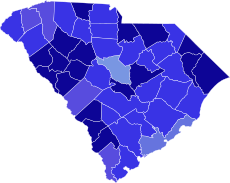 County results Johnston: 50–60% 60–70% 70–80% 80–90% >90% | |||||||||||||||||
| |||||||||||||||||
Incumbent Democrat Olin D. Johnston handily defeated Republican mayor of Clemson Leon P. Crawford. Olin D. Johnston, the incumbent Senator, faced no opposition from South Carolina Democrats and avoided a primary election. Leon P. Crawford, the mayor of the town of Clemson in the Upstate, faced no opposition from South Carolina Republicans and avoided a primary election. Crawford campaigned as a defender of states' rights and denounced Johnston for backing the New Deal and the Fair Deal. The state Republican Party believed that Crawford could have a chance in the election if he galvanized the 128,000 registered black voters, although they were weary of being labeled as the black party. In the end, Johnston remained highly popular with the voters who were still leery of the Republican party and he easily defeated Crawford in the general election.
| Party | Candidate | Votes | % | ±% | |
|---|---|---|---|---|---|
| Democratic | Olin D. Johnston (Incumbent) | 230,150 | 82.21 | −17.69% | |
| Republican | Leon P. Crawford | 49,695 | 17.75 | +17.75% | |
| Write-in | Write-Ins | 124 | 0.04 | −0.1% | |
| Majority | 180,455 | 64.46 | −35.34% | ||
| Turnout | 279,969 | 36.8 | |||
| Democratic hold | Swing | ||||
South Carolina (special)
[edit]
| |||||||||||||||||
| |||||||||||||||||
 County results Thurmond: 90-100% | |||||||||||||||||
| |||||||||||||||||
The special election resulted from the resignation of Senator Strom Thurmond on April 4, 1956, who was keeping a campaign pledge he had made in the 1954 election. Thurmond was unopposed in his bid to complete the remaining four years of the term. Senator Strom Thurmond faced no opposition from South Carolina Democrats and avoided a primary election. There was a possibility that Governor George Bell Timmerman Jr. might enter the race, but Thurmond was held in such high regard by the voters that there would have been no chance of defeating Thurmond. With no challenge to the remainder of the term, Thurmond did not conduct a campaign and rejoined his old law firm in Aiken until he returned to the Senate after the general election.
| Party | Candidate | Votes | % | ±% | |
|---|---|---|---|---|---|
| Democratic | Strom Thurmond | 245,371 | 100.0 | +36.9% | |
| Majority | 245,371 | 100.0 | +73.7% | ||
| Turnout | 245,371 | 32.2 | +5.9% | ||
| Democratic hold | Swing | ||||
South Dakota
[edit]
| |||||||||||||||||
| |||||||||||||||||
 County results Case: 50–60% 60–70% 70–80% Holum: 50–60% 60–70% | |||||||||||||||||
| |||||||||||||||||
| Party | Candidate | Votes | % | |
|---|---|---|---|---|
| Republican | Francis Case (Incumbent) | 147,621 | 50.79 | |
| Democratic | Kenneth Holum | 143,001 | 49.21 | |
| Majority | 4,620 | 1.58 | ||
| Turnout | 290,622 | |||
| Republican hold | ||||
Utah
[edit]
| |||||||||||||||||
| |||||||||||||||||
 County results Bennett: 50–60% 60–70% 70–80% Hopkin: 50–60% 60–70% 80–90% | |||||||||||||||||
| |||||||||||||||||
| Party | Candidate | Votes | % | |
|---|---|---|---|---|
| Republican | Wallace F. Bennett (Incumbent) | 178,261 | 53.96 | |
| Democratic | Alonzo F. Hopkin | 152,120 | 46.04 | |
| Majority | 26,141 | 7.92 | ||
| Turnout | 330,381 | |||
| Republican hold | ||||
Vermont
[edit]
| |||||||||||||||||
| |||||||||||||||||
Aiken: 50-60% 60-70% 70-80% 80-90% 90-100% O'Shea: 50-60% 60-70% 70-80% | |||||||||||||||||
| |||||||||||||||||
In Vermont, incumbent Republican George Aiken ran successfully for re-election to another term in the United States Senate, defeating Democratic challenger Bernard G. O'Shea.
| Party | Candidate | Votes | % | |
|---|---|---|---|---|
| Republican | George Aiken (Incumbent) | 49,454 | 99.9 | |
| Republican | Other | 27 | 0.1 | |
| Total votes | 49,481 | 100 | ||
| Party | Candidate | Votes | % | |
|---|---|---|---|---|
| Democratic | Bernard G. O'Shea | 7,997 | 99.8 | |
| Democratic | Other | 19 | 0.2 | |
| Total votes | 801 | 100 | ||
| Party | Candidate | Votes | % | |
|---|---|---|---|---|
| Republican | George Aiken (Incumbent) | 103,101 | 66.39 | |
| Democratic | Bernard G. O'Shea | 52,184 | 33.60 | |
| None | Scattering | 4 | 0.00 | |
| Majority | 50,917 | 32.79 | ||
| Turnout | 155,289 | |||
| Republican hold | ||||
Washington
[edit]
| |||||||||||||||||
| |||||||||||||||||
 County results Magnuson: 50–60% 60–70% 70–80% | |||||||||||||||||
| |||||||||||||||||
| Party | Candidate | Votes | % | |
|---|---|---|---|---|
| Democratic | Warren G. Magnuson (Incumbent) | 685,565 | 61.09 | |
| Republican | Arthur B. Langlie | 436,652 | 38.91 | |
| Majority | 248,913 | 22.18 | ||
| Turnout | 1,122,217 | |||
| Democratic hold | ||||
West Virginia (special)
[edit]
| |||||||||||||||||
| |||||||||||||||||
 County results Revercomb: 50–60% 60–70% 70–80% 80–90% Marland: 50–60% 60–70% | |||||||||||||||||
| |||||||||||||||||
Following the death of Harley M. Kilgore on February 28, 1956, William Laird III was appointed to fill this seat and assumed office on March 13, 1956.[2] Laird did not opt to run in the special election to fill the remainder of Kilgore's term through the end of the 85th Congress on January 3, 1959. As of 2024[update], this is the last time the Republicans have won West Virginia's Class 1 seat. This was also the last time until 2014 that the Republicans won a U.S. Senate election in the state.
| Party | Candidate | Votes | % | |
|---|---|---|---|---|
| Republican | William Chapman Revercomb | 432,123 | 53.67 | |
| Democratic | William C. Marland | 373,051 | 46.33 | |
| Majority | 59,072 | 7.34 | ||
| Turnout | 805,174 | |||
| Republican gain from Democratic | ||||
Wisconsin
[edit]
| |||||||||||||||||
| |||||||||||||||||
 County results Wiley: 50–60% 60–70% 70–80% Maier: 50–60% | |||||||||||||||||
| |||||||||||||||||
Incumbent Republican Senator Alexander Wiley easily won reelection to a fourth and final term, defeating the Democratic candidate, Henry W. Maier, by a margin of 17.4%. This would be the last time a Republican would win a Senate race in Wisconsin until Bob Kasten in 1980, and the last time a Republican would win more than 2 terms until Ron Johnson's victory in 2022.
| Party | Candidate | Votes | % | |
|---|---|---|---|---|
| Republican | Alexander Wiley (Incumbent) | 892,473 | 58.59 | |
| Democratic | Henry W. Maier | 627,903 | 41.22 | |
| Independent | Walter Semrau | 2,745 | 0.18 | |
| None | Scattering | 235 | 0.02 | |
| Majority | 264,570 | 17.37 | ||
| Turnout | 1,523,356 | |||
| Republican hold | ||||
See also
[edit]Notes
[edit]- ^ a b The Liberal Party in New York endorsed Robert F. Wagner Jr., a Democrat, but the Clerk of the U.S. House of Representatives did not tabulate their votes, totaling 300,648, into the national Democratic total.[1]
- ^ W. (William) Richard Stengel was an Illinois lawyer, state legislator and (after his loss to Dirksen) Rock Island County State's attorney and an Illinois judge. He died in 1994.
- ^ Morse was first elected in 1944 and re-elected in 1950 as a Republican. He became an independent in 1952 and joined the Democratic Party in 1955.
- ^ Colorado was the "tipping-point state".
References
[edit]- ^ a b c d e f g h i j k l m n o p q r s t u v w x y z aa ab ac ad ae af ag ah ai aj Clerk of the U.S. House of Representatives (September 15, 1958). "Statistics of the Presidential and Congressional Election of November 6, 1956" (PDF). U.S. Government Printing Office. p. 17, 40, 46, 53.
- ^ a b "SENATORS OF THE UNITED STATES, 1789-present, A chronological list of senators since the First Congress in 1789" (PDF). United States Senate. p. 64. Retrieved November 28, 2020.
- ^ Leo Egan (September 11, 1956). "G.O.P. UNANIMOUS; Attorney General Hails Party Stand Against Political 'Smears' Effect of Rumors Feared JAVITS IS NAMED FOR SENATE RACE Nominated by McGovern MacArthur Plea Presented Dewey Declines A Heck-Sprague Victory". The New York Times. ISSN 0362-4331. Retrieved August 10, 2020.
- ^ "Wagner's Address Accepting Democratic Senatorial Nomination; The Problems Involved 'These Are Serious Times'". The New York Times. September 11, 1956. ISSN 0362-4331. Retrieved August 10, 2020.
- ^ Douglas Dales; ROBERT WALKER (September 12, 1956). "STEVENSON PUTS RACIAL 'CLIMATE' UP TO PRESIDENT; Assails Eisenhower Stand-- Wins Liberal Nomination, With Mayor Wagner Party Nominates Slate STEVENSON BACKS ANTI-BIAS RULING". The New York Times. ISSN 0362-4331. Retrieved August 10, 2020.
- ^ "Write-in State Vote for M'arthur Urged". The New York Times. October 2, 1956. ISSN 0362-4331. Retrieved August 10, 2020.
- ^ "M'ARTHUR DISAVOWS BID; General Repeats He Is Not Candidate for Senate". The New York Times. October 3, 1956. ISSN 0362-4331. Retrieved August 10, 2020.
- ^ a b "Statistics of the Congressional and Presidential Election of November 6, 1956" (PDF). Office of the Clerk of the U.S. House. Retrieved July 8, 2014.
- ^ "Our Campaigns - OR US Senate Race - Nov 06, 1956". www.ourcampaigns.com.
- ^ a b "Primary Election Results" (PDF). Office of the Vermont Secretary of State. Retrieved June 17, 2015.
- ^ "General Election Results - U.S. Senator - 1914-2014" (PDF). Office of the Vermont Secretary of State. Archived from the original (PDF) on March 4, 2016. Retrieved June 17, 2015.
Sources
[edit]- 1956 U.S. Senate Election results
- Warren Weaver Jr (December 11, 1956). "STATE ELECTORS TO VOTE MONDAY; But Harriman Will Not Hold Reception for Republicans --Final Tally Listed Dewey Held Receptions 4.3 Million for Eisenhower". The New York Times. ISSN 0362-4331. Retrieved August 10, 2020.
- Supplemental Report of the Secretary of State to the General Assembly of South Carolina. Reports and Resolutions of South Carolina to the General Assembly of the State of South Carolina. Vol. I. Columbia, South Carolina. 1957. pp. 8–9.
{{cite book}}: CS1 maint: location missing publisher (link) - Kalk, Bruce H. (2001). The Origins of the Southern Strategy: Two-Party Competition in South. Lexington Books. pp. 30, 33.
- Bass, Jack; Thompson, Marilyn W. (1998). Ol' Strom: An Unauthorized Biography of Strom Thurmond. Longstreet. p. 155.


